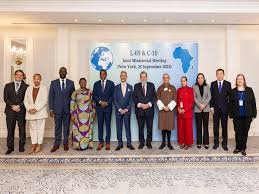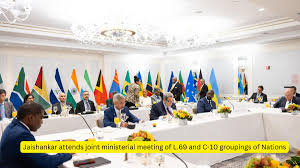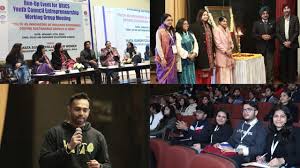Jaishankar Attends Joint Ministerial Meeting of L-69 and C-10 Groupings of Nations
Introduction to the Meeting
External Affairs Minister S. Jaishankar recently attended the joint ministerial meeting of the L-69 and C-10 groupings of nations. This significant diplomatic event took place amid rising global challenges and highlighted the necessity for international cooperation in various domains, particularly in the context of reforming global governance structures. The meeting brought together representatives from numerous countries, emphasizing the need for a united approach to address pressing issues like climate change, economic inequality, and health security.
Objectives of the L-69 and C-10 Groupings
The L-69 group, consisting of 69 developing countries, aims to advocate for the reform of the United Nations Security Council (UNSC). Its primary objective is to represent the interests of developing nations, ensuring that their voices are heard in critical global discussions. On the other hand, the C-10 group focuses on promoting the idea of a more democratic and equitable UNSC. During the meeting, discussions centered on enhancing collaboration among member nations to amplify their collective voice and influence in global decision-making.
Key Discussions and Outcomes
During the meeting, Jaishankar emphasized the importance of solidarity among member nations to tackle shared challenges. He pointed out that global governance should reflect contemporary realities and be more inclusive of the perspectives of developing countries. The discussions also covered strategies to strengthen multilateralism and address issues such as terrorism, sustainable development, and the ongoing impacts of the COVID-19 pandemic. The outcomes of this meeting could play a pivotal role in shaping future diplomatic efforts and international policies.
Conclusion
The joint ministerial meeting of the L-69 and C-10 groupings of nations reflects a growing recognition of the need for reform in global governance. By fostering collaboration among developing nations, it aims to create a more equitable international system that addresses the challenges of the modern world.

Why This News is Important
Significance in Global Governance
The meeting attended by S. Jaishankar is crucial as it highlights the ongoing efforts to reform global governance structures, particularly the United Nations Security Council. This reform is essential to ensure that the voices of developing nations are adequately represented in international decision-making processes. With the world facing numerous challenges, a more inclusive governance framework is necessary for effective responses.
Impact on International Relations
The discussions held during the meeting can significantly influence diplomatic relations among member countries. By advocating for solidarity and collaboration, the L-69 and C-10 groupings strengthen their collective bargaining power on the global stage. This unity is vital for addressing transnational issues such as climate change, terrorism, and health crises.
Addressing Global Challenges
The meeting underscores the necessity for international cooperation to tackle shared global challenges. The emphasis on issues like climate change and economic inequality reflects a growing awareness of the interconnectedness of nations. As countries face common threats, collaborative efforts become imperative for sustainable solutions.
Fostering Development
By bringing together developing nations, the meeting provides a platform for these countries to voice their concerns and aspirations. It advocates for equitable development strategies that prioritize the needs of marginalized communities, promoting sustainable growth and prosperity.
Strengthening Multilateralism
The joint meeting reinforces the importance of multilateralism in addressing global issues. In an increasingly polarized world, the commitment to working together is essential for achieving common goals and ensuring lasting peace and security.
Historical Context
Background of the L-69 and C-10 Groupings
The L-69 grouping was formed in response to the longstanding demand for reforms in the UNSC. Recognizing that the existing structure does not adequately represent the interests of developing countries, member nations sought to create a coalition that could advocate for their concerns. The C-10 group was established to further this agenda, aiming to push for a more democratic and equitable UNSC that includes a greater number of permanent and non-permanent members from the Global South.
Previous Meetings and Developments
Historically, the call for UNSC reform has gained momentum over the past few decades, with various proposals put forth by different nations. Previous meetings of the L-69 and C-10 have focused on building consensus among member countries, addressing challenges such as geopolitical tensions and the need for a united front against global threats.
Key Takeaways from “Jaishankar Attends Joint Ministerial Meeting of L-69 and C-10 Groupings of Nations”
| S.No | Key Takeaway |
|---|---|
| 1 | S. Jaishankar attended the joint ministerial meeting of L-69 and C-10 groupings. |
| 2 | The L-69 group advocates for UNSC reform representing 69 developing countries. |
| 3 | The C-10 group promotes a more democratic and equitable UNSC. |
| 4 | Discussions focused on global challenges like climate change, economic inequality, and health security. |
| 5 | The meeting highlights the importance of multilateralism and collaboration among developing nations. |
Important FAQs for Students from this News
1. What are the L-69 and C-10 groupings?
The L-69 group consists of 69 developing countries advocating for reforms in the United Nations Security Council (UNSC). The C-10 group aims to promote a more democratic and equitable UNSC.
2. Why is the reform of the UNSC important?
Reforming the UNSC is crucial to ensure that the voices of developing nations are represented in global decision-making processes, making international governance more inclusive and equitable.
3. What key issues were discussed in the recent meeting?
The meeting focused on global challenges such as climate change, economic inequality, health security, terrorism, and the need for enhanced multilateral cooperation among member nations.
4. Who attended the joint ministerial meeting?
The meeting was attended by various representatives from the L-69 and C-10 groupings, including India’s External Affairs Minister S. Jaishankar.
5. How can the outcomes of this meeting influence international relations?
The outcomes can strengthen diplomatic relations among developing nations, enabling them to present a unified stance on global issues and enhance their collective bargaining power in international forums.
Some Important Current Affairs Links


















